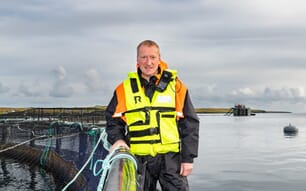The sector offers an opportunity to be exploited if the aquaculture industry in particular can grow and develop.
The aquaculture sector in the EU is worth 3.1 billion a year producing 1.3 million tonnes of seafood – 50 per cent shellfish and crustaceans, 28 per cent fin fish and 22 per cent fresh water fish.
It is also responsible for 80,000 jobs connected to the sector.
However, aquaculture is just 10 per cent of the total seafood and fisheries market for the EU and with 75 per cent of the fish stocks being over fished and also being unable to meet consumer demand the reliance on imports is growing.
In total 65 per cent of the European seafood consumption is imported.
Speaking at the Shellfish Association of Great Britain annual conference in London Viktoria Varga Lencses from DG Mare at the European Commission said that if aquaculture could increase productivity by one per cent to meet the rise in consumption and to reduce the deficit in production compared to imports, it would increase the number of jobs connected to the sector by between 3,000 and 4,000.
To help meet the increasing demand and to make the aquaculture sector more sustainable within EU fisheries, the commission has put forward a four point plan within the reforms of the Common Fisheries Policy.
The Commission is proposing a new basic regulation and a new market regulation. It is also looking to introduce a new financial instrument in the European Marine and Fisheries Fund (EMFF) and new aquaculture research in the EU through Horizon 2020 and the Aquaculture Advisory Council.
“Aquaculture has been underfunded and it is a priority under the EMFF,” said Ms Lencses.
She added that the Commission also wanted to see more use of the Horizon 2020 financial tool for aquaculture projects and research.
Ms Lencses said that the Commission wants to see a new soft approach to regulation in the new basic regulation on fisheries, although the basic legislation has not changed.
“We want to find ways forward through strategic guidelines to find common priorities and targets,” she said.
She added that each state will have to translate these priorities into a national plan, which together will for a multinational strategic plan.
“The way forward is exchange of information and best practices,” Ms Lencses said.
She added that to facilitate this, the Commission will be organisation seminars on best practice in the future.
The aim is to reduce administrative burdens and help to give aquaculture companies and organisations access to water and space.
She said the Commission wants to improve competitiveness and exploit the competitive advantage the EU aquaculture sector has, because it will struggle to compete with the lower production costs from the developing areas of South East Asia,
“We need to move forward, because aquaculture in the EU has been stagnating,” said Ms Lencses.
In highlighting the administrative burden the sector finds itself under she said that whereas in Norway it can take just six months to license a new aquaculture farm, in the EU it takes two to three years and in some circumstances it can take seven years.
“This is because Norway offers a one stop shop for people wanting to set up a fish farm,” she said.
”We need to change to offer certainty to the producer.”
Ms Lencses said that similar action needs to be taken to offer easier access to space and water to make the sector more sustainable.
“We have to make sure that it brings business opportunities and makes aquaculture far more competitive. We need to identify business differentiation.”
Speaking at a conference for the Federation of Veterinarians of Europe in Brussels, Dario Dubolino also from DG Mare at the Commission reinforced the message of competitiveness.
“We have to have a level playing field for the producers to compete with people in third countries where they are more competitive,” he said.
This has to be achieved, he said, while not compromising environmental protection, fish health and consumer safety.
“We need to inform consumers through labels and campaigns and we need to exploit niche markets.”
The progress of the plan of action to support the aquaculture sector will see the countries in the EU deliver their national plans to the Commission by the end of this year.



